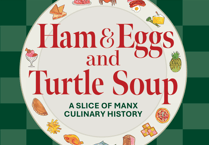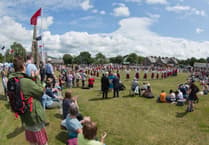The ninth Manx Bard Boakesey Close is set to hang up her robe and hand over her staff at the end of this month after a year in the role.
Before she bows out, we’ve asked her to list her personal top ten favourite poets and their respective best poems.
Over to you, Boakesey...
1. Dylan Thomas - ‘Do Not Go Gentle Into That Good Night’
Possibly the most famous example of the ‘villanelle’ format and an extremely powerful, emotional poem in which the poet begs his father to fight against death.
2. Annie Kissack - ‘Bonnag’
I love how my fellow Manx Bard, Annie, captures the essence of Manx traditions, culture and humour in this piece. I love all her work, but this has to be my favourite. Culture Vannin have a number of Annie’s poems on their website if you wish to check them out.
3. Gaia Holmes – ‘The Allure Of Frost’ and ‘The Lord’s Prayer’
I ‘met’ Gaia online during the pandemic when we both attended online poetry sessions. These profound, caring poems were written whilst her father was suffering from cancer and demonstrate her feelings of despair and loss. Somehow, they still manage to convey a feeling of hope, which is something we all need.
4. Janet Lees - ‘I’ve got drama, can’t be stolen’
Janet is well known for her international prize-winning poetry films, my favourite one of which is this example. It’s about her sister and is truly remarkable.
5. Philip Larkin - ‘This be the Verse’
I HAD to include this. Sorry for the ‘F’ word, but apart from being written with wry humour, it also happens to be true!
6. Bobbie Sparrow - ‘The Last Swim’
Bobbie is a friend of mine who lives on the western coast of Eire. She is published by Yaffle Press. This poem is for all the wild swimmers out there and is also a reminder of the restrictions we endured during Covid.
7. Kim Moore’s ‘Loving the “I”’ and Clare Shaw’s ‘Flood as Redemption’
This is cheating a little bit, but these two poets work very closely together. Kim’s poem is a lovely piece about personal identity and how she encourages her own daughter to learn and appreciate that she is her own person. Clare’s is completely different and reflects on the aftermath of devastating floods experienced at Hebden Bridge, where she lived.
8. Mary Oliver - ‘When Death Comes’
This sounds like a morbid poem, but is actually a celebration of life. Mary’s work is a staple of therapeutic writing.
9. Brian Bilston - ‘Refugees’
This is one of those clever poems that means something when you first read it, but if you then read it backwards, has an even stronger, opposite meaning.
10. W. H. Davies - ‘Leisure’
This will be familiar to many of you, I’m sure, as it’s been used in TV commercials and elsewhere. Although written in Victorian times, it’s still a valid reflection on our busy modern lifestyles and how we ‘have no time to stand and stare’.




